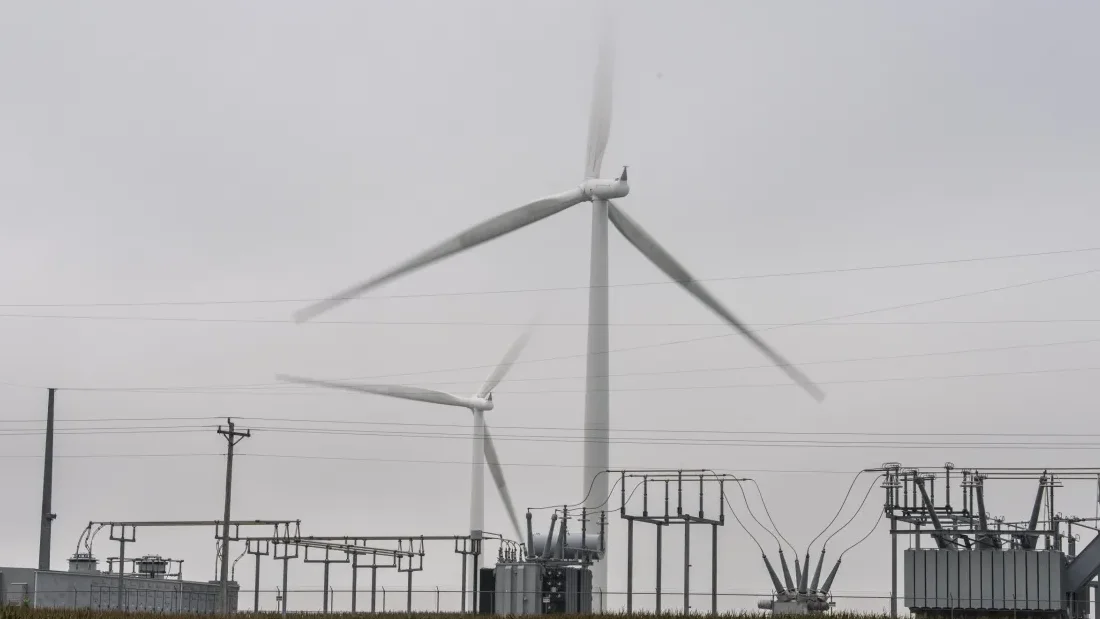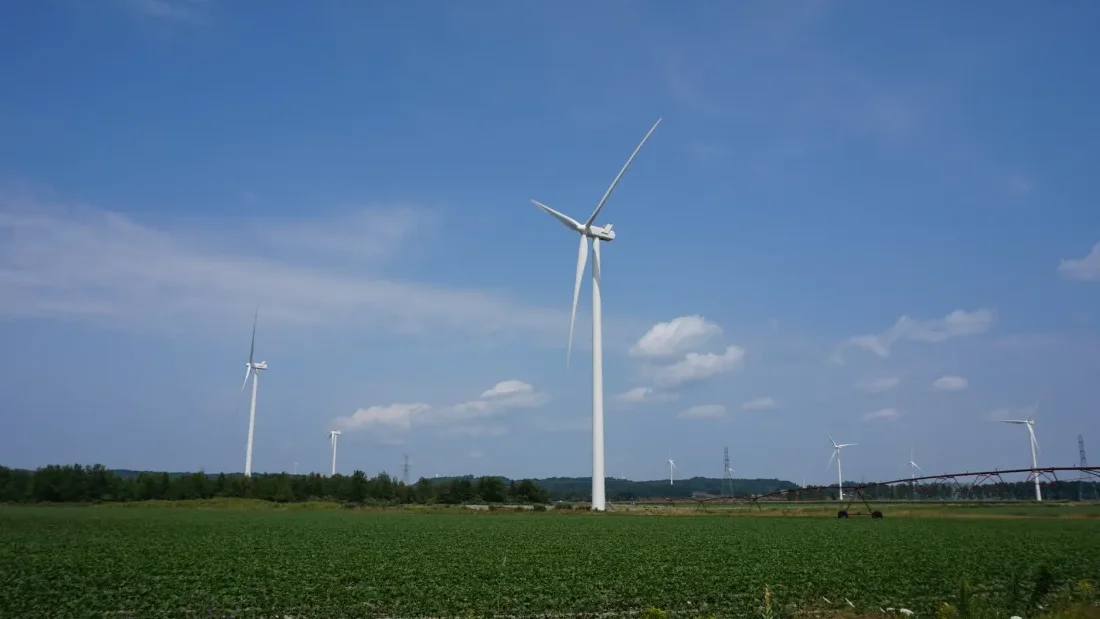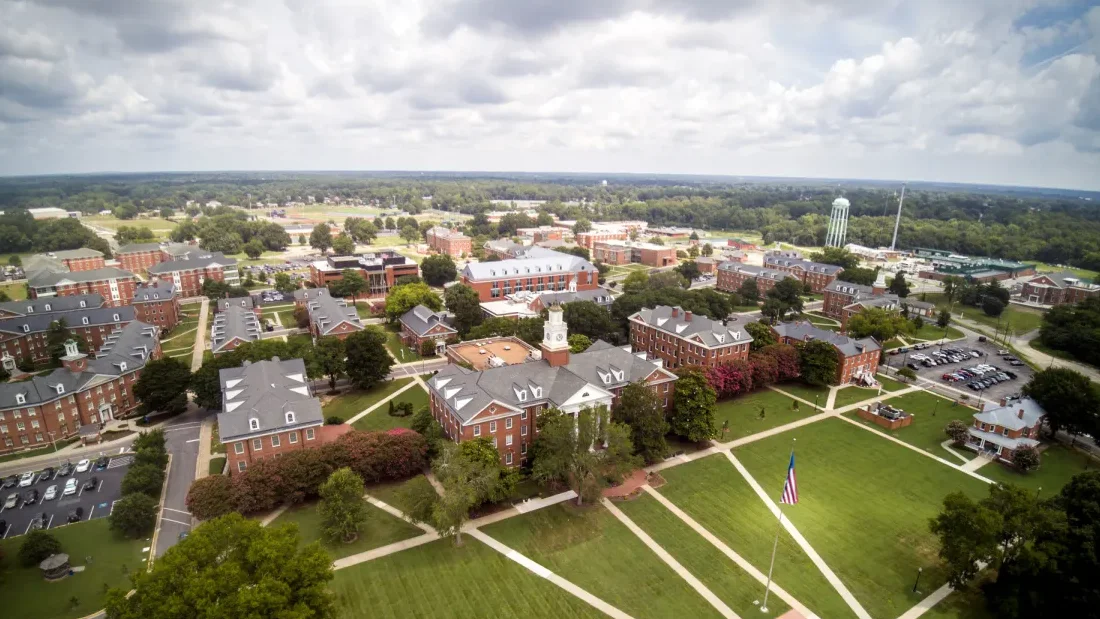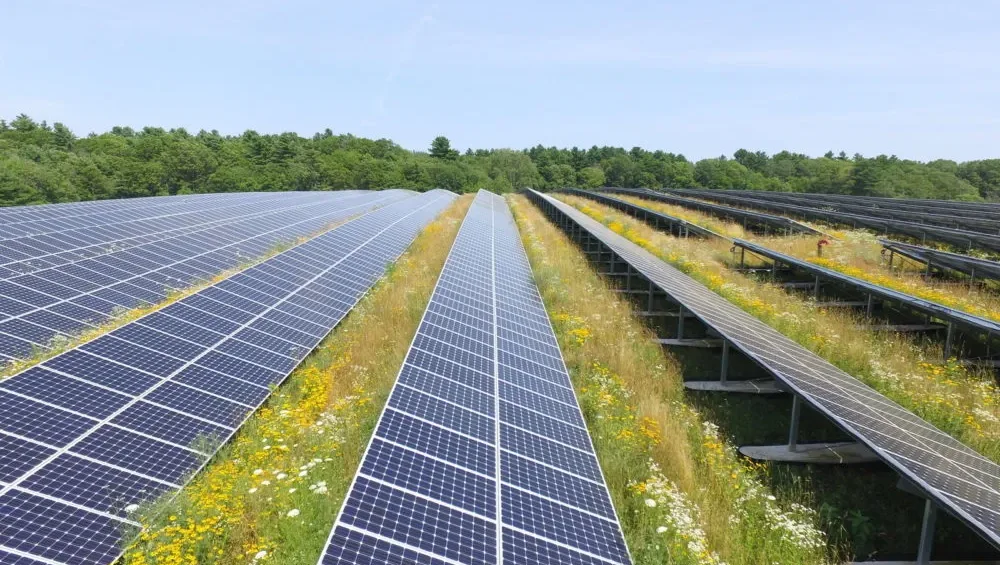
WIND: Delaware lawmakers advance a bill to the governor’s desk that, if signed, would lead to offshore wind energy procurement. (WBOC)
ALSO:
GRID:
SOLAR:
POLICY: In New York, decades-old state laws are still on the books that encourage ongoing residential fossil fuel use, despite much more recent climate action policies and mandates. (Newsday)
ELECTRIC VEHICLES: A charging e-bike battery sparks a fire in New York City that sends several people to the hospital and destroys two businesses and two apartments. (NYDN)
TRANSIT: Federal infrastructure funds could help revive passenger rail between Scranton, Pennsylvania, and New York City, if state and local politics don’t get in the way first. (Pennsylvania Capital-Star)
COMMENTARY:

WIND: Federal officials give their approval for the 2.8 GW Atlantic Shores project, the first offshore wind facility in New Jersey. (Power Technology, NJ Biz)
ALSO: A developer begins a $200 million repowering project at a wind project in Pennsylvania’s Somerset County, an upgrade that should raise its 139 MW generation capacity by 30%. (news release)
GRID: Avangrid and Barnstable, Massachusetts, reach an agreement allowing the developer to lay power cables at a beach and under a river in exchange for numerous financial guarantees, like compensation for businesses harmed during construction. (Barnstable Patriot)
SOLAR: In southern Maine, vandalism at an under-construction solar project causes an estimated half-million dollars in damage expected to delay the site’s operations by weeks; a police investigation is underway. (WMTW)
RENEWABLE POWER: A New York county will decide whether to opt out of a state law exempting commercial renewable energy projects from property taxes, which would simplify the tax structure of such facilities but disincentivize developers from selecting sites there. (Syracuse.com)
ELECTRIC VEHICLES: A Harvard climate fellow is using artificial intelligence to better understand drivers’ hesitancy to transition to electric vehicles, scanning charging station reviews to uncover preferences and problems. (Boston Globe)
CLIMATE:
TRANSIT: New York lawmakers mull a lower base fee or dynamic pricing for the Manhattan congestion pricing program to persuade the governor to allow the program to go ahead, though former President Donald Trump’s potential return to office could kill the plan anyway. (Gothamist)
PIPELINES: A Pennsylvania environmental resources hearing attracts several advocates concerned with how a proposed gas pipeline in Lycoming County would impact local trails, wetlands, trout streams and sediment. (Penn Live Patriot-News)
FLOODS:
COMMENTARY:

COAL: Unprecedented federal funding from the Bipartisan Infrastructure Law is helping Southwest Virginia diversify its economy through redevelopment of abandoned mine land sites. (Virginia Mercury)
CLIMATE: Austin, Texas’ city council considers asking voters to approve a climate bond to help pay for projects related to the city’s climate goals, but the mayor wants to delay the process until 2026. (KXAN)
ELECTRIC VEHICLES: Rivian reports that it sold more electric vehicles than it manufactured in the last quarter, during which the company also reiterated its plans to build a factory in Georgia. (Atlanta Journal-Constitution)
SOLAR:
OIL & GAS: Texas oil and gas regulators ask the state’s attorney general to sue the U.S. EPA over its decision to list the dunes sagebrush lizard as endangered. (E&E News, subscription)
UTILITIES: Entergy New Orleans promotes a new vice president of regulatory and public affairs who will lead the company’s engagement with the New Orleans City Council. (news release)
POLITICS: Florida Congressmember Anna Paulina Luna has invested hundreds of thousands of dollars into a political donor’s oil and gas company. (Tampa Bay Times)
COMMENTARY:

Solar developers are hoping that listening to local communities in Ohio early in the design stage will boost their chances for success before state regulators.
“We are really invested in and committed to being good neighbors,” said Lindsey Workman, community affairs manager for Vesper Energy. The company held three meet-and-greet sessions in Greene County this spring for its proposed Aviation Energy Center project, in addition to earlier meetings with trustees for several townships.
Another developer, Open Road Renewables, also hosted listening tour sessions this spring to learn about community issues and residents’ concerns related to its proposed Grange Solar project in Logan County. The meetings began at the end of April and ran through June.
The companies’ proactive community engagement approach comes as some Ohio solar projects have faced significant local opposition, often stoked by fossil fuel interests. State policy under a 2021 law known as Senate Bill 52 also has empowered anti-solar groups to ban many renewable energy projects or pressure local elected officials to oppose them.
“I think it will be a trend,” to seek community input early on, especially if it helps lessen local opposition, said Jane Harf, executive director for Green Energy Ohio, which counts multiple solar developers among its members. At the same time, “it’s really hard to quantify opposition,” Harf added. A minority of opponents can be much more vocal and apply more pressure to local officials than a majority of people who are supporters or just neutral.
“And [there] is a lot of organized opposition,” Harf said. “This isn’t just grassroots. This is being fed by national organizations.”
Open Road Renewables currently faces challenges from two opposition groups relating to its proposed Frasier Solar Project in Knox County. The Energy News Network has reported on links between speakers for one of the groups and pro-fossil fuel interests.
Vesper Energy faced opposition for its proposed Kingwood Solar project in Greene County, which led the the Ohio Power Siting Board to reject the company’s application based on substantial local opposition. The case is before the Ohio Supreme Court on appeal. The company argues, in essence, that the board’s legal responsibility to determine the public interest extends beyond assessing how popular a project appears to be locally based on the numbers of comments for and against it.
These companies hope that early, proactive outreach to the community can help smooth the paths for their latest projects before they begin the formal power siting board process.
“We’ve been putting a very heavy emphasis on public engagement and, more importantly, listening to concerns from as many stakeholders as we can in the community,” said Doug Herling, a vice president for Open Road Renewables.
Patricia Hicks heads Outcomes Management Group, a Columbus-based consulting firm, which helped run the listening sessions for Open Road Renewables. The team aimed to invite people representing a broad spectrum within the county.
“You want to make sure that you don’t just get one group of people providing information,” she said. “You don’t want to have a biased listening group.”
During the sessions, small groups were also asked both closed- and open-ended questions. Hicks’ firm is working now to finalize a report on the feedback, both positive and negative.
While companies say footprints for the Aviation Energy Center and Grange Solar projects have not yet been finalized, they say insights from the community input will help guide how those boundaries are determined.
Open Road Renewables plans to use the report from Hicks’ firm to develop a set of commitments to the community. Getting feedback earlier in the process can help the company tailor the project to deal with specific concerns, versus waiting to negotiate more permit conditions later, Herling said.
The final report from Outcomes Management Group will also help the company make the community concerns section of the project’s power siting board application more robust, Herling said. Hicks expects the work also will help the company in future communication efforts relating to the project.
Vesper Energy has already committed that the Aviation Energy Center project won’t border nonparticipating landowners’ properties on more than one side, Workman said. Setbacks from residential property lines, state parks and other public lands also will range from 300 to 500 feet, which is more than Ohio Power Siting Board rules require.
“We care about the feedback, and that’s what we heard,” Workman said.
Workman said Vesper Energy is willing to make similar commitments if it wins the Kingwood Solar case on appeal. She noted the company also has donated nearly $40,000 in the past year to support work in Greene County by various nonprofit groups, including the Ohio State Parks Foundation, Camp Clifton 4-H Camp, Yellow Springs Community Foundation, Family Promise of Greene County, and Greene County FISH Pantry.
“There’s no strings,” Workman said. “We’re trying to make sure that we become good neighbors.”
Such strategies are also bets that listening now can save headaches later.
Attendees and others have praised the companies’ approach, but it’s too soon to say how successful it will be.
Logan County Administrator David Henry didn’t attend the Grange Solar sessions in person and said he isn’t in a position to speak for or against the project. He added that new, non-grandfathered projects are banned for unincorporated areas of most of the county’s townships under SB 52. Nonetheless, Henry commended Open Road Renewables for holding the sessions about the proposed project.
“I will say that I’m glad that Open Road Renewables is allowing the public to have their input on it both positively and negatively — they’ve had plenty of both,” Henry said. “I think that’s a good idea on their part to let people have their voice heard.”
Members of the Greene County Board of Commissioners would not comment for this story due to ongoing litigation, said Ashley Schommer at the Greene County offices. The county is one of the intervenors against the Kingwood Solar project in Vesper Energy’s appeal.
“Vesper seems interested in listening to community feedback and seeing what it can do to be a cooperative business entity,” said Kate LeVesconte, a local resident who is part of a local pro-solar group. “I think that is a really good idea when it is interacting with legitimate concerns and not disinformation-driven fear.”
Unfortunately, LeVesconte added, she hears a lot of false information, such as claims about contamination, arguments about whether farmland can eventually be restored and more.
“We’re still facing an uphill battle regarding this relatively conservative area feeling that solar farms are probably not good for prime agricultural land,” she said.
Real estate agent Chris Blosser, who attended one of the four listening sessions Open Road Renewables hosted in Logan County, said the company “is doing everything right, and they’re covering all their bases. They’re doing things to address people’s concerns.”
She gave the example of the company committing to provide an upfront bond to restore the property at the end of the project’s lifespan.
“Unfortunately, there’s quite an organized effort to fight this installation,” Blosser said. Others at the listening session she attended had already gone to some anti-solar meetings. “And they had information that had been spoon-fed to them.”
A large percentage of people who attended the Open Road Renewables sessions or answered its online survey said they got their news from social media, Hicks said. As a result, many were relying on information that hadn’t been verified.
At the same time, many people at the meetings did want to ask questions, she noted. And if people were able to remain open-minded, they could see potential benefits from the project, Hicks said. Beyond asking about concerns, attendees were asked how they would want to see company payments used in the community. The responses included new insights for the company to consider.
“Listening brings all kinds of interesting discoveries,” Hicks said.
Meanwhile, opponents of utility-scale solar projects have been hosting their own meetings to stir up discontent.
For example, Citizens for Greene Acres is an opponent of Vesper Energy in the Kingwood Solar case, and most of its activities so far have focused on that project.
And in Logan County, a group called Indian Lake Against Industrial Solar has mobilized to oppose Open Road Renewables’ Grange Solar project. The county has already had experience with two other anti-solar groups opposing the proposed Fountain Point solar farm: No Solar in Logan County and Citizens against Fountain Point.
“Developers in the solar industry earn trust in communities by communicating proactively with interested parties and addressing questions posed by community members,” said Will Hinman, executive director for the Utility Scale Solar Energy Coalition of Ohio. Conversations start before applications are filed and continue throughout projects’ siting, construction and operational phases.
For now, Vesper Energy and Open Road Renewables hope their efforts and planned follow-up will lay the groundwork for that trust.
Grange Solar and the Aviation Energy Center are both in the early stages. Both developers’ efforts come before two public information meetings they will need to hold before filing formal applications for the projects. The updated Ohio Power Siting Board rule took effect on May 30.
Open Road Renewables plans to submit its application sometime in September, Herling said. The company expects it might then get a decision from the Ohio Power Siting Board by the end of next year.
Vesper Energy doesn’t have a definitive timeline yet for the Aviation Energy Center or the Kingwood Solar project. “This commitment to community collaboration is our guiding principle,” Workman said. “Our goal is to get it right, however long that takes.”

WIND: The 924 MW Sunrise Wind project receives final approval from federal ocean energy officials to be built off the Long Island coast. (news release)
ALSO:
FOSSIL FUELS:
COURTS: Maine’s attorney general seeks to dismiss a lawsuit from youth and environmental advocates claiming officials have failed to follow the state’s 2019 carbon emissions reduction law. (Maine Morning Star)
SOLAR:
TRANSIT: A number of state lawmakers who oppose the now-indefinitely paused Manhattan traffic congestion tolling program weren’t able to provide an alternative plan for funding New York City’s transit agency. (New York Focus)
FINANCE: Federal energy officials issue $45 million in grants to Washington, D.C., Pennsylvania and Vermont, among other states, to form energy efficiency revolving loan funds to reduce the cost of clean energy projects. (news release)
ELECTRIC VEHICLES: New Haven, Connecticut, will kick off a new short-term e-bike rental program later this summer, although details haven’t been finalized yet. (New Haven Independent)
WORKFORCE: A western Massachusetts community college receives an over $832,000 state grant to boost its programming for electric vehicle charging station installation, energy auditing, solar installation and other green jobs. (Daily Hampshire Gazette)
UTILITIES: An open at-large seat on the Delaware Electric Cooperative’s board attracts five candidates; the election will be held in August. (news release)

WIND: Dominion Energy showcases its use of environmentally friendly bubble curtains and vibrations to set monopiles as it moves forward with construction of a $9.8 billion offshore wind farm near Virginia. (Virginia Mercury)
ELECTRIC VEHICLES:
SOLAR:
UTILITIES: Clean energy advocates tell North Carolina regulators they should push Duke Energy to build more renewables and dial back its plans for new gas plants to meet an anticipated spike in power demand. (WFAE)
OIL & GAS:
PIPELINES:
GRID:
COMMENTARY:

WIND: With 21 of its planned 62 wind turbines completely installed, Vineyard Wind claims to now be the largest operating wind project in the country, pushing 136 MW to the grid. (electrek)
SOLAR:
RENEWABLE POWER:
GRID:
FOSSIL FUELS:
CLEAN TECH: For Boston’s clean tech hub dream to become reality, observers say it needs a “flagship” firm to attract workers and innovative ideas — but could that kickstarter be GE Vernova? (Boston Globe)
BIOENERGY: A proposed class action lawsuit has been filed in Massachusetts against a home heating oil dealer, which allegedly claimed to be selling them biodiesel when they weren’t. (Law360)
AFFORDABILITY: In a rural Maine county, residents subject to recently rising Versant Power rates discuss their affordability concerns. (The County)

SOLAR: Louisiana regulators approve a sleeved power purchase agreement to purchase power from non-utility sources for a coalition of 26 companies, including some of the state’s largest industrial giants, that have grown frustrated with the lack of renewables available from utilities. (Louisiana Illuminator)
ALSO:
ELECTRIC VEHICLES:
CLEAN ENERGY: Columbus, Georgia, business leaders say they’re building out the area’s higher education systems and freeing up land in hopes of taking part in the clean energy manufacturing boom that’s seen $32 billion invested in the state since 2021. (Columbus Ledger-Enquirer)
OIL & GAS:
HYDRO: A federal loan program provides $16.6 million for construction of the third of six planned hydroelectric plants in Kentucky, while a grant will fund solar power at a farm. (Kentucky Lantern)
GRID: A Virginia county supervisor proposes requiring new data centers to build on-site power to limit the use of eminent domain and construction of new transmission lines. (Loudoun Times-Mirror)
EMISSIONS: Researchers find plumes of toxic gas at the fenceline of some chemical plants in Louisiana’s “Cancer Alley” to be more than 1,000 times higher than what the U.S. EPA deems “an acceptable risk.” (Inside Climate News)
UTILITIES:
COAL: Businesses owned by West Virginia Gov. Jim Justice reach a settlement with a Virginia bank over roughly $300 million in outstanding loans, but now face the prospect of the forced sale of a coal company to satisfy different debts. (Cardinal News, WV Metro News)
COMMENTARY: A college student interviews climate activist Bill McKibben about the campaign to push the Tennessee Valley Authority away from building new natural gas-fired power plants toward solar power. (Tennessean)

Along with new tax breaks for families and businesses in return for investing in clean and more efficient energy, the federal government is for the first time offering support to schools and other nonprofits that make those investments.
“Direct support” payments from the Internal Revenue Service will pay back school districts, churches and other nonprofit organizations for part of what they spend on energy renovations that cut their energy use and replace fossil fuels.
For schools the program represents an opportunity to make energy upgrades that many have had to skimp on, according to Nathan Ugoretz, secretary-treasurer of the Wisconsin Education Association Council.
As state school funding falls behind the rising costs public school districts face, “funding for maintenance and improvements have been put on the chopping block,” Ugoretz said Thursday. School districts across Wisconsin have held referendum votes to raise property taxes to support ongoing expenses.
“This leaves no resources for overhauling outdated electrical systems or investments to cut energy costs,” Ugoretz said.
Ugoretz spoke at Forest Edge Elementary School, a Fitchburg school that has been singled out for its strides in improving energy efficiency. In 2021, the school, after operating for just one year, was recognized as the first Net Zero Energy school in Wisconsin — producing and returning to the power grid as much energy as it used.
The BlueGreen Alliance, an advocacy group that combines the interests of the labor and environmental movements, chose the school Thursday for a presentation on how clean energy and energy efficiency tax credits under the 2022 Inflation Reduction Act are available to more than just taxpayers, whether individuals or businesses.
Direct IRS support that passes those tax credits on to nonprofits will help accelerate the spread of green technology to more users, participants in Thursday’s event said.
“That is a really, really big deal — not only because we get to model for our students what a clean energy economy looks like, but because utility costs for schools are one of the biggest demands on school budgets,” said Kristina Costa, deputy assistant to President Joe Biden for clean energy innovation and implementation. “And when energy costs go up, that leaves fewer resources available for everything else that students need to do.”
Cutting those costs by boosting energy efficiency “frees up those precious dollars to improve our schools and in other ways to enrich our kids’ education,” Costa added.
Spurred by the Inflation Reduction Act, businesses have invested $1.7 billion on clean power projects in Wisconsin through May 2024, according to the White House.
“This is a win, win, win,” said Rep. Mark Pocan (D-Town of Vermont) — for improving education resources, for labor and “more professional job development to have good wages and benefits. Pocan praised the Biden administration for taking “the high road,” adding, “it’s a win for the environment because ultimately we’re addressing climate change through addressing the rising cost of energy.”
Forest Edge school was built well before the Inflation Reduction Act was signed into law, but as Wisconsin’s first net-zero energy school, “it’s an example of what’s possible for schools across the state,” state Carly Eaton, Wisconsin policy manager for BlueGreen Alliance.
From the start the Oregon School District facility was developed to be as energy efficient and clean-energy focused as possible, school district officials said.
A total of 1,704 solar panels line the flat rooftops of the building, providing enough electricity that the district is able to sell some of it back to the power grid, according to Andy Weiland, Oregon School District business manager. Walls of glass maximize natural light in the building, while the panes are specially treated to darken automatically in sunlight to prevent the building interior from heating up.
Geothermal energy, which draws heat from deep below the earth’s surface, and heat pump technology warm the school — and also keep it cool when the weather outside is warm.
“For the most part we don’t have to use any fossil fuels at all,” Weiland said as he gave a tour of the building Thursday.
Had the district been able to use the Inflation Reduction Act’s direct support program when it was building the school, the savings, Weiland speculated, “would have been several million dollars.”
Beyond the savings that the act promises for people and organizations that use its incentives to upgrade their energy systems, the legislation has also been championed for provisions that require contractors to pay employees prevailing local wages on projects that qualify for the full values of tax credits. It also requires projects to employ participants in licensed apprenticeship programs.
The two requirements help stabilize the construction workforce, said Emily Pritzkow, executive director of the Wisconsin Building Trades Council, which represents about 40,000 Wisconsin members in several construction unions.
“By utilizing competitive labor standards, including an area’s standard wages, benefits and training opportunities, we are ensuring the economic impact of these projects stays in our local community for generations to come,” Pritzkow said.

SOLAR: Korean solar company Qcells expands its deal with a developer to provide 2 GW of modules from its Georgia factory for community solar projects by 2027 — the largest community solar partnership in U.S. history. (Korea Herald, news release)
ALSO:
OIL & GAS:
WIND: Dominion Energy begins installing turbine foundations as it continues building its 176-turbine offshore wind farm near Virginia. (WHRO)
RENEWABLES: A California firm agrees to purchase stakes in a 250 MW solar farm, a 226 MW wind farm and a 350 MW wind farm, all located in Texas. (Renewables Now)
HYDROGEN: The oil and gas industry’s lawsuit against the U.S. EPA questioning the process of developing clean hydrogen as a fuel for long-haul trucks grinds against efforts by Exxon Mobil and Chevron to champion the new technology. (Houston Chronicle)
COAL: A federal watchdog releases a report finding an agency’s process for distributing funding to states and tribes to clean up old coal mines is plagued by problems that have resulted in delays, poor tracking and confusion over the process. (E&E News)
NUCLEAR: West Virginia U.S. Sen. Shelley Moore Capito calls on state officials to ensure they’ve prepared sites for the construction of small modular nuclear reactors after her legislation heads to President Biden for his signature. (WV News)
BUILDINGS: A North Carolina developer constructs 11 new homes built to federal Zero Energy Ready Home standards that are priced for first-time homebuyers. (WSOC)
ELECTRIC VEHICLES: A Texas school district will purchase 15 electric buses with $6.1 million in federal funding. (KXAS)
GRID:
CLIMATE:
COMMENTARY: Louisiana should engage communities around ports and leverage federal funding to reduce toxic emissions, environmental injustice and the potential for lawsuits, writes an activist. (The Advocate)